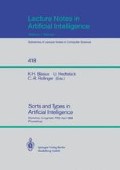Abstract
According to the principles of Qualitative Reasoning physical systems are represented by deep models (component or process oriented) and are simulated on the basis of the models, either by interpretation of the models or by envisioning. Models of Qualitative Reasoning can be conceived as logical theories, but not as arbitrary ones, rather as theories that have models in the model theoretic sense. Sorts are an integral part of Qualitative Reasoning models, although in the existing approaches only slight attention is pasid to this feature. So sorts can be used to guide the construction of composite models from primitive ones and to specify models.
Preview
Unable to display preview. Download preview PDF.
References
J.F. Allen: Maintaining knowledge about temporal intervals. CACM 26.11 (1983) 832–843.
D.G. Bobrow (ed.): Qualitative reasoning about physical systems. Special volume of AI. AI 24 (1984).
J. de Kleer, J.S. Brown: A qualitative physics based on confluences. AI 24 (1984) 7–83.
W. Dilger, G. Zifonun: The predicate calculus-language KS as query language. In: H. Gallaire, J. Minker (eds.): Logic and data bases, Plenum Press, New York 1978, 377–408.
W. Dilger, J. Kippe: COMODEL: A language for the representation of technical knowledge. In: Proceedings of IJCAI 85, Los Angeles 1985, 352–358.
W. Dilger: Composing qualitative models. TEX-B Memo 39-88, FhG-IITB, Karlsruhe 1988.
K.D. Forbus: Qualitative process theory. AI 24 (1984) 85–168.
P.J. Hayes: A logic of actions. In: Machine Intelligence 6, Edinburgh University Press 1971, 495–520.
P.J. Hayes: The naive physics manifesto. In: D. Michie (ed.), Expert Systems in the Micro-Electronic Age,Edinburgh University Press 1979, 242–270.
P.J. Hayes: The logic of frames. In: D. Metzing (ed.): Frame conceptions and text understanding, de Gruyter, Berlin 1980, 46–61.
A. Janson-Fleischmann, G. Sutschet: A process oriented approach for qualitative modelling and analysis of dynamical systems. In: H.-W. Früchtenicht et al. (eds.): Technische Expertensysteme: Wissensrepräsentation und Schlussfolgerungs-verfahren, Oldenbourg-Verlag, München 1988, 227–247.
J. Kippe: Komponentenorientierte Repräsentation technischer Systeme. In: H.-W. Früchtenicht et al. (eds.): Technische Expertensysteme: Wissensrepräsentation und Schlussfolgerungsverfahren, Oldenbourg-Verlag, München 1988, 155–226.
B. Kuipers: Commonsense reasoning about causality: Deriving behavior from structure. AI 24 (1984) 169–203.
J. McCarthy, P.J. Hayes: Some philosophical problems from the standpoint of artificial intelligence. In: Machine Intelligence 4, Edinburgh University Press 1969, 463–502.
A. Oberschelp: Order Sorted Predicate Logic. This volume.
H.R. Pople: A goal-oriented language for the computer. In: H.A. Simon, L. Siklossy (eds.): Representation and meaning, Prentice Hall, Englewood Cliffs, NJ, 1972, 329–413.
E. Sandewall: Representing natural language information in predicate calculus. In: Machine Intelligence 6, Edinburgh University Press 1971, 255–277.
P. Struss: Assumption-based reasoning about device models. In: H.-W. Früchtenicht et al. (eds.): Technische Expertensysteme: Wissensrepräsentation und Schlussfolgerungsverfahren, Oldenbourg-Verlag, München 1988, 23–54.
H. Voss: Representing and analyzing causal, temporal, and hierarchical relations of devices. Ph.D. Thesis, University of Kaiserslautern, 1986.
Author information
Authors and Affiliations
Editor information
Rights and permissions
Copyright information
© 1990 Springer-Verlag Berlin Heidelberg
About this paper
Cite this paper
Dilger, W., Voß, H. (1990). Sorts in qualitative reasoning. In: Bläsius, K.H., Hedtstück, U., Rollinger, CR. (eds) Sorts and Types in Artificial Intelligence. Lecture Notes in Computer Science, vol 418. Springer, Berlin, Heidelberg . https://doi.org/10.1007/3-540-52337-6_25
Download citation
DOI: https://doi.org/10.1007/3-540-52337-6_25
Published:
Publisher Name: Springer, Berlin, Heidelberg
Print ISBN: 978-3-540-52337-6
Online ISBN: 978-3-540-46965-0
eBook Packages: Springer Book Archive

